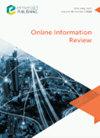表情包自私吗?网络表情包如何反映以色列新冠疫情
IF 3.1
3区 管理学
Q2 COMPUTER SCIENCE, INFORMATION SYSTEMS
引用次数: 0
摘要
本文旨在通过分析模因的内容、形式和立场三个组成部分,探讨在新冠肺炎大流行危机中,模因是否以及如何提供特定社会的全貌。设计/方法/方法作者从2020年3月至2019年2月,从以色列两个最大的Facebook群中收集了每月点赞数最多的25个表情包,从对COVID-19的认识显著提高的月份开始。共收集到597个模因。对数据进行定量和定性分析。研究结果表明,模因文化有效地反映了一个社会的状况和面临的挑战。表情包也反映了当地的文化符号和效果。模因内容因群体而异。在危机期间,模因不能成为尖锐批评或呼吁采取行动解决社会弊病的肥沃群体。模因文化可以作为一种工具,通过模因文化来理解和探索陌生的外国文化、其心理状态和历史。社交意义meme可能是通过轻松的幽默来缓解压力的平台,没有真正的行动号召;这就是“懒汉行动主义”,它给人一种积极参与的感觉,而不参与实际的变革活动。独创性/价值研究表明,以色列的模因文化并不激进,而是以幽默来缓解压力。模因可能被用作“面包和马戏”,也可能被用作“懒汉行动主义”(slacktivism)的一种手段,而不能呼吁真正的行动主义。同行评议本文的同行评议历史可在:https://publons.com/publon/10.1108/OIR-07-2022-0381本文章由计算机程序翻译,如有差异,请以英文原文为准。
Are memes selfish? How Internet memes reflect crisis–Covid-19 pandemic in Israel
PurposeThe paper aims to explore, using an analysis of the three components of memes content, form and stance – whether and how the memes offer a broad picture of a specific society during the COVID-19 pandemic crisis.Design/methodology/approachThe author collected, from the two largest Facebook groups in Israel, 25 memes with the largest number of likes in each month, beginning from the month in which awareness of COVID-19 increased significantly, between March 2020 and February 2019. A total of 597 memes were collected. The data were analyzed by a quantitative and qualitative analysis.FindingsFindings indicate that meme culture effectively reflects a society’s situation and the challenges it faces. Memes also reflect local cultural icons and effects. Meme contents vary across groups. During a crisis, memes do not function as fertile groups for sharp criticism or calls to take action to resolve society’s social ills.Practical implicationsMemes may serve as a tool to understand and explore an unfamiliar, foreign culture, its state of mind and its history through meme culture.Social implicationsMemes may constitute a platform for relieving stress through light-hearted humor, unaccompanied by a true call to action; that is, “slacktivism” which gives a sense of active participation without involvement in actual activities for change.Originality/valueThe study reveals that the Israeli meme culture is not activist and rather focuses on humor to relieve stress. Memes may be used as “bread and circuses” or a means of “slacktivism” that fails to call to genuine activism.Peer reviewThe peer review history for this article is available at: https://publons.com/publon/10.1108/OIR-07-2022-0381
求助全文
通过发布文献求助,成功后即可免费获取论文全文。
去求助
来源期刊

Online Information Review
工程技术-计算机:信息系统
CiteScore
6.90
自引率
16.10%
发文量
67
审稿时长
6 months
期刊介绍:
The journal provides a multi-disciplinary forum for scholars from a range of fields, including information studies/iSchools, data studies, internet studies, media and communication studies and information systems.
Publishes research on the social, political and ethical aspects of emergent digital information practices and platforms, and welcomes submissions that draw upon critical and socio-technical perspectives in order to address these developments.
Welcomes empirical, conceptual and methodological contributions on any topics relevant to the broad field of digital information and communication, however we are particularly interested in receiving submissions that address emerging issues around the below topics.
Coverage includes (but is not limited to):
•Online communities, social networking and social media, including online political communication; crowdsourcing; positive computing and wellbeing.
•The social drivers and implications of emerging data practices, including open data; big data; data journeys and flows; and research data management.
•Digital transformations including organisations’ use of information technologies (e.g. Internet of Things and digitisation of user experience) to improve economic and social welfare, health and wellbeing, and protect the environment.
•Developments in digital scholarship and the production and use of scholarly content.
•Online and digital research methods, including their ethical aspects.
 求助内容:
求助内容: 应助结果提醒方式:
应助结果提醒方式:


